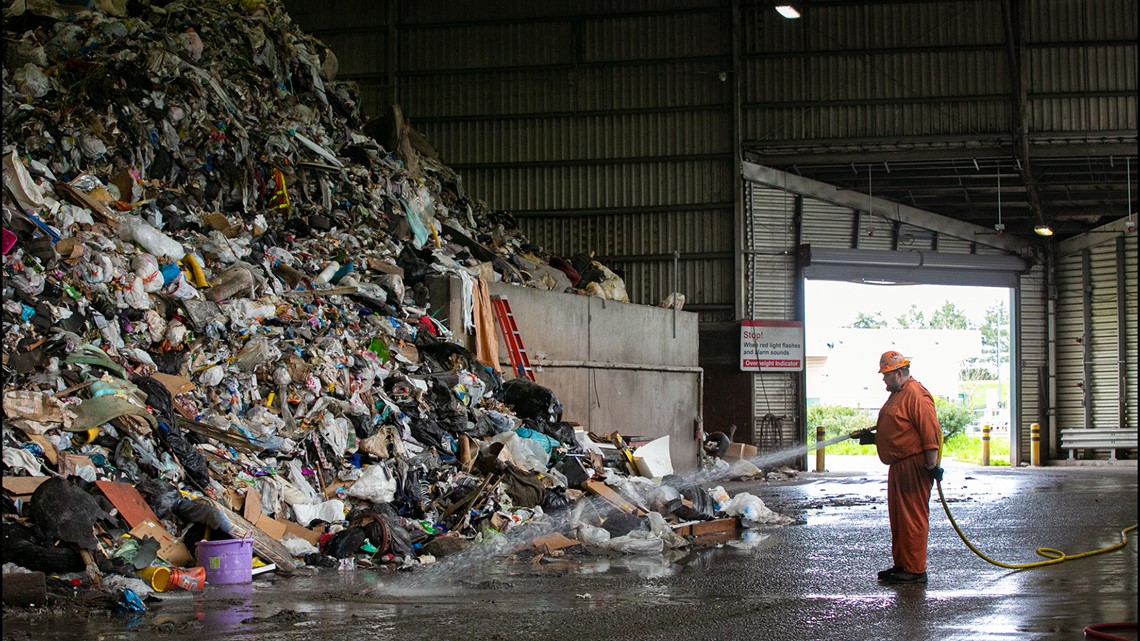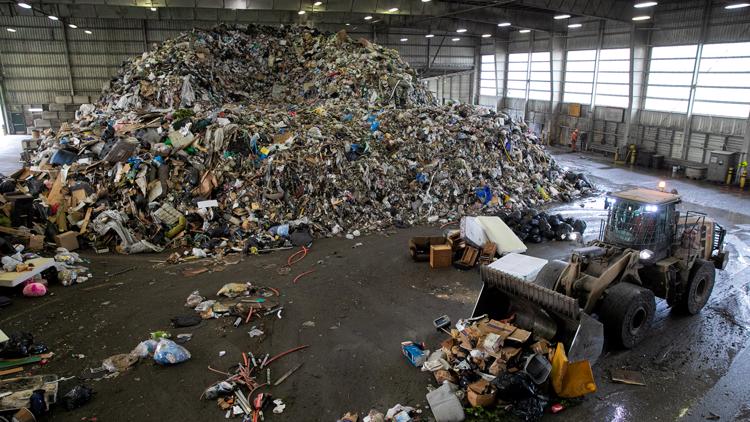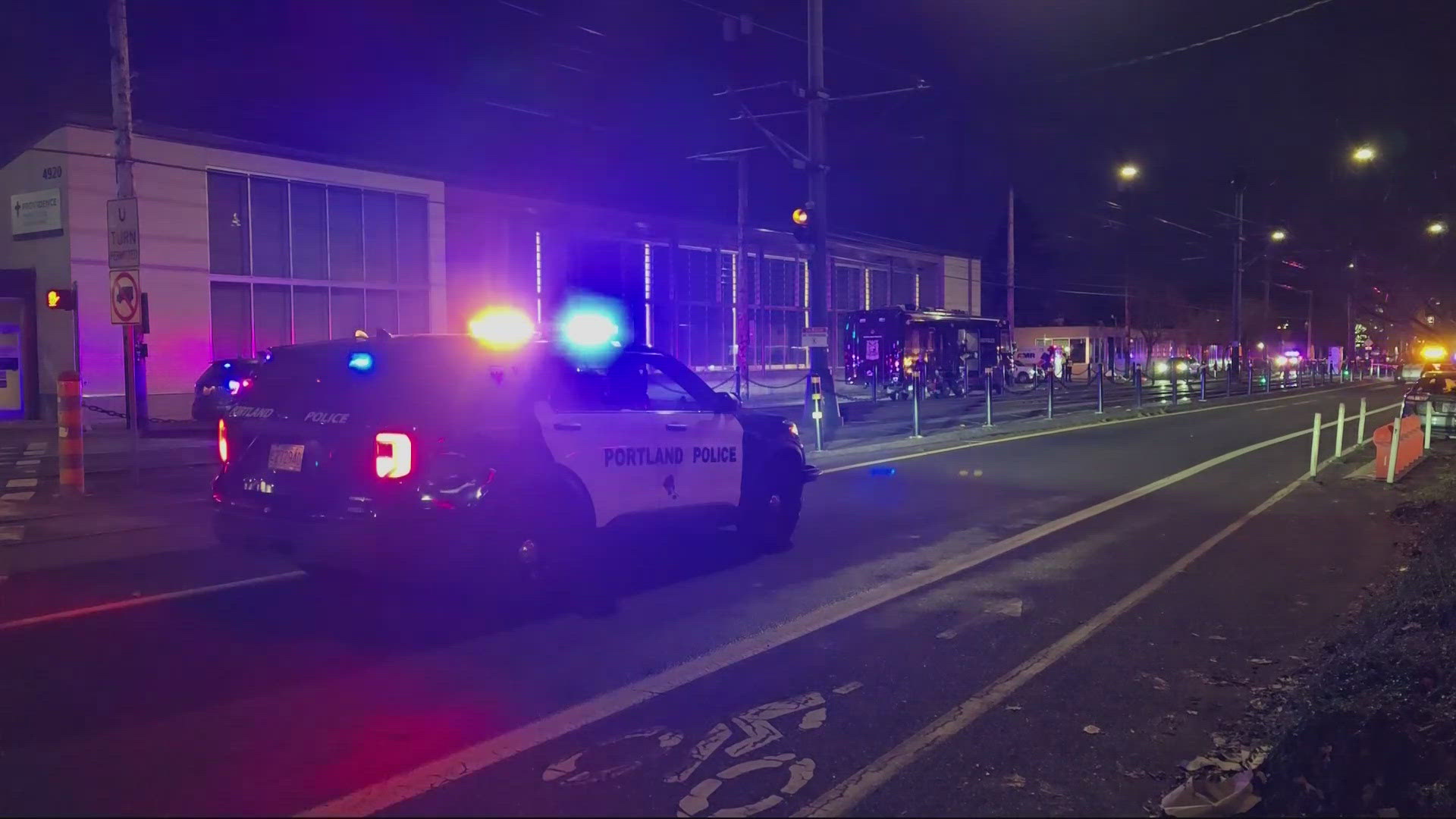EVERETT, Wash. — Since January, a massive mountain of garbage has been growing at the Airport Road transfer station near Everett. The stinky pileup almost touches the warehouse ceiling.
The sour stench is drifting further and further down the road. But the real danger is the organic matter decomposing deep within.
“Microscopic organisms start eating it, and when they do, they generate heat,” Solid Waste Director Dave Schonhard said. “It can actually cause a fire. It’s from spontaneous combustion deep inside the pile.”
Operations manager Steve McLean has his team on a 24/7 fire watch, armed with temperature-sensing guns. The summit is crushed under its own weight, releasing steam like a brewing volcano.
The trick, McLean said, is “making sure it stays steam, and not smoke.”
All three local dumps are grappling with the same challenge. A trash backlog weighing millions of pounds is causing long lines, pausing services and threatening the shutdown of what county officials deem “critical infrastructure.”


On Friday, McLean scaled the Airport Road dump mezzanine, where grime accumulates like thick moon dust. Below, the main floor looks like a stinky demolition derby.
Heavy machinery thunders back and forth, breaking up janky furniture and pushing it down into compactors. Normally, workers in orange jumpsuits pick at a 300-ton garbage heap each day. This week, they were driving trackhoes onto a 4,500-ton mountain.
What’s behind the trashy crisis?
Republic Services has hauled our waste to Klickitat County since 1992. But this year, container shortages, staffing problems and complications with the railroad led to two notices of “Class C Default” from Snohomish County.
Officials approved an emergency agreement this week. For $2 million, Waste Management in Oregon will lend a hand, taking Snohomish County’s junk across the Columbia River.
The contract spans six months. But it’s unclear how long it will take to clear the backlog. There’s still a threat of temporary shutdown.
The pile is so huge that McLean’s team isn’t separating yard waste for composting anymore. There’s no room. The trash mountain is blocking half the parking spots residents use to dump their waste, so lines are stretching down the road. The crisis is taking a toll on equipment that scales the precarious summit of old mattresses, coffee machines and moldy food.
So far, McLean hasn’t had to turn away any garbage trucks looking to ditch curbside waste. But those drivers are being affected by longer wait times, he said.
At the county’s intermodal yard, 30-ton containers of compacted trash are loaded onto trains. But these days, about 300 containers are sitting, chocked full, with nobody to move them.
“They’re stacked three high, four deep, and as far as the eye can see. It’s endless,” supervisor Marcus Gruber said. “We can’t burn it. We can’t dump it in the Sound like in the old days.”
Flies buzz around the yard, but the metal containers keep the smell at bay for the most part. There’s a sense of urgency with summer on the way.
“Just wait until it gets 80, 85 degrees,” Gruber said.
The county’s three transfer stations are also revving up their “vector control.”
That’s just a “cute name,” Schonhard said, for “rat control.”
“We have employees, we have customers, we have neighbors,” he said. “We want to be mindful.”
Employees are asking the public to be patient and to check out the lines on the county’s website before heading out.
“Basically, the turnaround time is double,” Schonhard said. “Usually they’re pretty forgiving when they look at the pile. They’re like, ‘Wow, that’s why I had to wait in line.’”
In reality, the backlog at the transfer stations only represents about a week’s worth of garbage.
“Stuff like this gives people a new perspective of how much we actually go through as a community,” McLean said.
As for the $2 million the county is shelling out to fix the problem, Public Works Director Kelly Snyder said it’s “the cost of doing business.”
“Right now we have to be focusing on safety and health and the environment,” she said. “That’s the top priority.”



